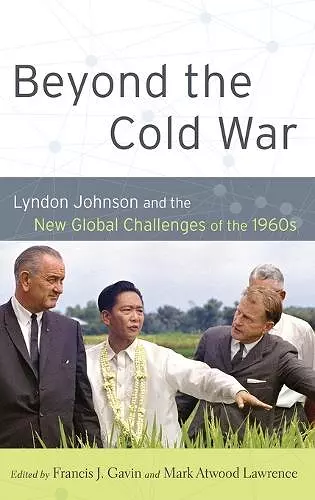Beyond the Cold War
Lyndon Johnson and the New Global Challenges of the 1960s
Francis J Gavin editor Mark Atwood Lawrence editor
Format:Hardback
Publisher:Oxford University Press Inc
Published:30th Jan '14
Currently unavailable, and unfortunately no date known when it will be back
This hardback is available in another edition too:
- Paperback£38.49(9780199790708)

In writing about international affairs in the 1960s, historians have naturally focused on the Cold War. The decade featured perilous confrontations between the United States and the Soviet Union over Berlin and Cuba, the massive buildup of nuclear stockpiles, the escalation of war in Vietnam, and bitter East-West rivalry throughout the developing world. Only in recent years have scholars begun to realize that there is another history of international affairs in the 1960s. As the world historical force of globalization has quickened and deepened, historians have begun to see that many of the global challenges that we face today - inequality, terrorism, demographic instability, energy dependence, epidemic disease, massive increases in trade and monetary flows, to name just a few examples - asserted themselves powerfully during the decade. The administration of President Lyndon B. Johnson confronted tectonic shifts in the international environment and perhaps even the beginning of the post-Cold War world. While the ideologically infused struggle between the United States and the Soviet Union was indisputably crucial, new forces and new actors altered international relations in profound and lasting ways. This book asks how the Johnson administration responded to this changing landscape. To what extent did U.S. leaders understand the changes that we can now see clearly with the benefit of hindsight? How did they prioritize these issues alongside the geostrategic concerns that dominated their daily agendas and the headlines of the day? How successfully did Americans grapple with these long-range problems, with what implications for the future? What lessons lie in the efforts of Johnson and his aides to cope with a new and inchoate agenda of problems? This book reconsiders the 1960s and suggests a new research agenda predicated on the idea that the Cold War was not the only - or perhaps even the most important - feature of international life in the period after World War II.
Distinguished historians Frank Gavin and Mark Lawrence have assembled an all-star cast of young scholars of U.S. foreign relations to shed new light on the 1960s, a decade we thought we already knew perhaps too well. These excellent essays focus on contemporary global issues of the greatest importance-environmental change, energy, poverty and disease, human rights, religion, globalization-and trace them back to their emergence as policy concerns during the Lyndon Johnson administration. The authors challenge and expand our understanding of national security in a global age. This is some of the best of the new U.S. international history. * Thomas Borstelmann, author of The Cold War and the Color Line *
ISBN: 9780199790692
Dimensions: 163mm x 239mm x 20mm
Weight: 692g
316 pages